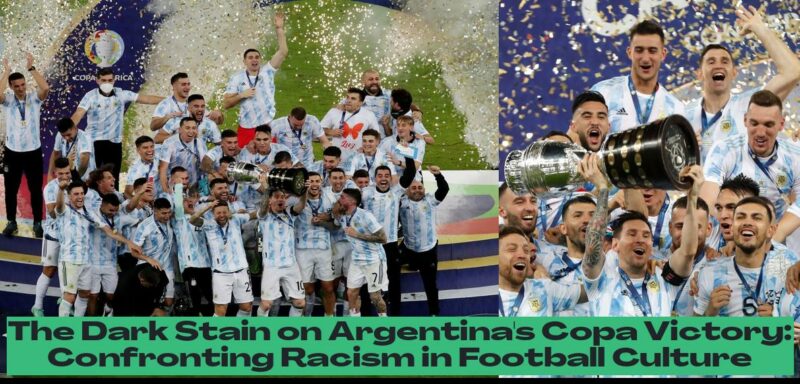Argentina’s Copa Victory Tarnished by a Song of Hate
Argentina’s triumph in the Copa America, a moment of national pride and celebration, was marred by a deeply troubling incident that exposed a dark underbelly of the nation’s football culture. The celebratory chorus, a song sung by some members of the Argentine squad, questioning the heritage of France’s black and mixed-race players, sparked widespread condemnation and ignited a heated debate about racism and xenophobia in Argentina.
The video, featuring several members of the Argentina team, went viral on social media, quickly attracting the attention of FIFA, who launched an investigation into the matter. The French Football Federation condemned the song, deeming its lyrics “racist and discriminatory.” The global repercussions of this incident were immediate, prompting a reaction from the Argentine government. While the right-wing administration of Javier Milei might not be known for its sensitivity towards ‘woke’ issues, Julio Garro, the under-secretary for sports, urged team captain Lionel Messi and local FA president Claudio Tapia to issue an apology for the offensive song. Garro’s call for accountability, however, was met with resistance, and he was subsequently sacked for his comments.
The incident brought to light a deeply entrenched problem in Argentine football culture. The tendency to make monkey gestures towards Brazilian opponents in continental club competitions, often justified as “banter” by perpetrators, reveals a disturbing pattern of racist behavior. Argentine clubs have often tried to address this issue, but their efforts have been half-hearted, with the use of terms like “xenophobia” instead of directly confronting the inherent racism. The fact that some Argentine players have participated in this behavior is particularly appalling, raising serious questions about the lack of awareness and sensitivity among professional athletes who represent their country on the global stage.
- Argentina’s Copa America victory celebration was overshadowed by a racist song sung by some team members targeting France’s black and mixed-race players.
- The incident sparked global condemnation, with FIFA launching an investigation and the French Football Federation denouncing the song as “racist and discriminatory.”
- The Argentine government, despite its right-wing stance, called for accountability and urged team captain Lionel Messi and FA president Claudio Tapia to issue an apology for the offensive song.
- The incident highlighted a prevalent issue of racism in Argentine football culture, including making monkey gestures towards Brazilian opponents, often dismissed as “banter.”
- Efforts to address racism in Argentine football have been insufficient, with clubs using terms like “xenophobia” instead of directly confronting the inherent racism.
- The disturbing behavior raises concerns about the lack of awareness and sensitivity among professional athletes representing Argentina on the global stage.
Why Do They Do It?
The lyrics of the song, which originated during the Qatar World Cup final, were deeply disturbing, not only for their blatant racism but also for their historical implications. They insult not just black players and fans, but also Argentina’s own heritage. While the presence of black Argentines is rare today, this wasn’t always the case. During the Spanish colonial era, Argentina imported fewer enslaved Africans than neighboring Brazil, and abolished slavery decades earlier. However, two hundred years ago, Buenos Aires had a significant black population, constituting almost a third of the city’s inhabitants.
The Disappearance of Argentina’s Black Population
The decline of Argentina’s black population is a complex issue with various contributing factors. Theories abound, ranging from outbreaks of yellow fever to deaths during the war for independence. However, the most plausible explanation is the massive influx of European and Middle Eastern immigrants, particularly from Italy, who arrived in Argentina during the late 19th and early 20th centuries. This influx effectively overwhelmed the existing population, leading to a dramatic shift in the country’s demographics.
The Legacy of African Influence
Despite the reduction in their numbers, the African influence on Argentina’s cultural fabric remains undeniable. The country’s most prominent cultural export, tango, is a testament to this legacy. The word “tango” itself has African origins, and the music and dance, like many other genres in the Americas, are a fusion of African, European, and indigenous influences. Interestingly, tango’s journey mirrored the reverse trajectory of football in Argentina. While football began as an elite sport and gradually permeated the lower strata of society, tango originated in the lower rungs and eventually gained recognition and acceptance among the elites.
The Racial Hierarchy and Its Lasting Impact
The arrival of European immigrants in Argentina was driven by a specific ideology. During the late 19th and early 20th centuries, eugenic ideas, which promoted the notion of racial hierarchy and superiority, were widely embraced. South American leaders believed that they could “improve” and “civilize” their countries by importing a white workforce. This racialized project, motivated by a desire for a “whiter” population, had a profound and lasting impact on Argentina’s social fabric.
The song that some Argentina players sang, while celebrating their Copa America victory, reflects the lingering effects of this racial hierarchy. The lyrics reveal a deep-seated prejudice, a belief that certain races are inherently inferior. This incident is not an isolated event, but a symptom of a pervasive problem that requires urgent attention and a concerted effort to dismantle entrenched racist attitudes.
A Need for Change and Accountability
The Copa America incident highlighted the need for meaningful action to address racism in Argentine football. It’s not enough to simply condemn the behavior; there needs to be a systematic approach to promoting inclusivity and challenging racist attitudes. This requires a commitment from both players and institutions to educate themselves about the impact of their actions and to actively promote diversity and respect.
The Argentine Football Association must take a leading role in this effort. They must implement robust measures to prevent racist behavior, including strict sanctions for players and fans who engage in such conduct. Education and awareness campaigns are crucial to challenge the deeply rooted racist attitudes that have persisted for generations.
Moreover, the Argentine government must play an active role in fostering a more inclusive society. This includes addressing racial disparities in areas like education, employment, and healthcare. A genuine commitment to equality and social justice is essential to combat racism and promote a more just and equitable society for all Argentines.
Argentina’s Copa America victory should have been a moment of unadulterated joy and national pride. However, the shameful incident that tarnished the triumph serves as a stark reminder of the need for continued efforts to combat racism and promote inclusivity in all aspects of Argentine society. Only through collective action and a genuine commitment to change can Argentina truly achieve a future where its triumphs are celebrated without the stain of hate.









